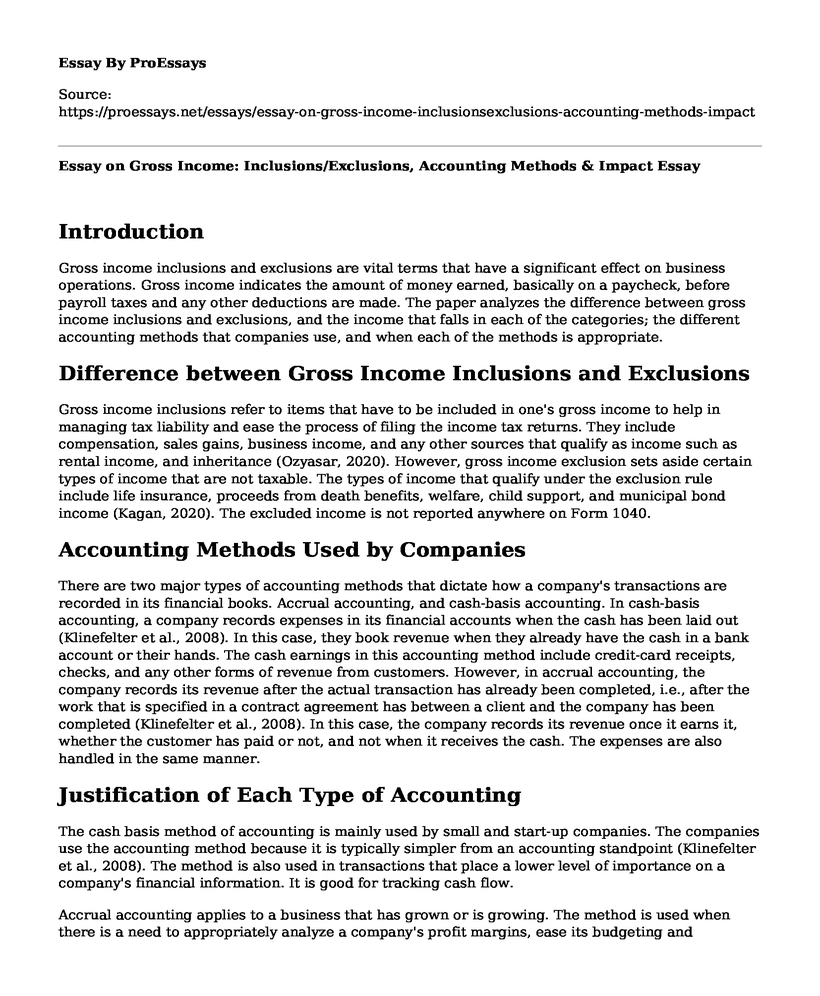Introduction
Gross income inclusions and exclusions are vital terms that have a significant effect on business operations. Gross income indicates the amount of money earned, basically on a paycheck, before payroll taxes and any other deductions are made. The paper analyzes the difference between gross income inclusions and exclusions, and the income that falls in each of the categories; the different accounting methods that companies use, and when each of the methods is appropriate.
Difference between Gross Income Inclusions and Exclusions
Gross income inclusions refer to items that have to be included in one's gross income to help in managing tax liability and ease the process of filing the income tax returns. They include compensation, sales gains, business income, and any other sources that qualify as income such as rental income, and inheritance (Ozyasar, 2020). However, gross income exclusion sets aside certain types of income that are not taxable. The types of income that qualify under the exclusion rule include life insurance, proceeds from death benefits, welfare, child support, and municipal bond income (Kagan, 2020). The excluded income is not reported anywhere on Form 1040.
Accounting Methods Used by Companies
There are two major types of accounting methods that dictate how a company's transactions are recorded in its financial books. Accrual accounting, and cash-basis accounting. In cash-basis accounting, a company records expenses in its financial accounts when the cash has been laid out (Klinefelter et al., 2008). In this case, they book revenue when they already have the cash in a bank account or their hands. The cash earnings in this accounting method include credit-card receipts, checks, and any other forms of revenue from customers. However, in accrual accounting, the company records its revenue after the actual transaction has already been completed, i.e., after the work that is specified in a contract agreement has between a client and the company has been completed (Klinefelter et al., 2008). In this case, the company records its revenue once it earns it, whether the customer has paid or not, and not when it receives the cash. The expenses are also handled in the same manner.
Justification of Each Type of Accounting
The cash basis method of accounting is mainly used by small and start-up companies. The companies use the accounting method because it is typically simpler from an accounting standpoint (Klinefelter et al., 2008). The method is also used in transactions that place a lower level of importance on a company's financial information. It is good for tracking cash flow.
Accrual accounting applies to a business that has grown or is growing. The method is used when there is a need to appropriately analyze a company's profit margins, ease its budgeting and forecasting, and a need to look for additional financing opportunities (Klinefelter et al., 2008). The method provides a better picture of the financial results of the company and provides room to make more informed decisions that would provide additional value to the company.
Conclusion
To conclude, gross income inclusions indicate the items that have to be included in one's gross income when managing tax liability while exclusions set aside certain types of income that are not taxable. The two major accounting methods used by companies are accrual accounting and cash-basis accounting. The cash basis accounting is mainly used by small and start-up companies while accrual accounting is used on businesses that have already grown or have attained some level of growth.
References
Kagan, J. (2020). Income exclusion rule. Investopedia.com. https://www.investopedia.com/terms/i/identified-shares.asp
Klinefelter, D. et al. (2008). Financial management: cash vs. accrual accounting. Researchgate.net. https://www.researchgate.net/publication/26904412_Financial_Management_Cash_vs_Accrual_Accounting
Ozyasar, H. (2020). Accounting for gross income inclusions. Chron.com. https://smallbusiness.chron.com/accounting-gross-income-inclusions-18074.html
Cite this page
Essay on Gross Income: Inclusions/Exclusions, Accounting Methods & Impact. (2023, May 03). Retrieved from https://proessays.net/essays/essay-on-gross-income-inclusionsexclusions-accounting-methods-impact
If you are the original author of this essay and no longer wish to have it published on the ProEssays website, please click below to request its removal:
- Intercom Enterprise Auditing Paper Example
- Is HIPAA Sufficient? Essay Example
- Case for and Against Central Bank Independence - Paper Example
- Essay Sample on Real Estate Investment Benefits
- Essay on PCAOB: Regulating Independent Audits in the US Since 2002
- Unlock Benefits of Corporate Learning: Know the Process & Reason
- Essay Example on Accounting Changes: Principles, Reporting Entity, Estimates







